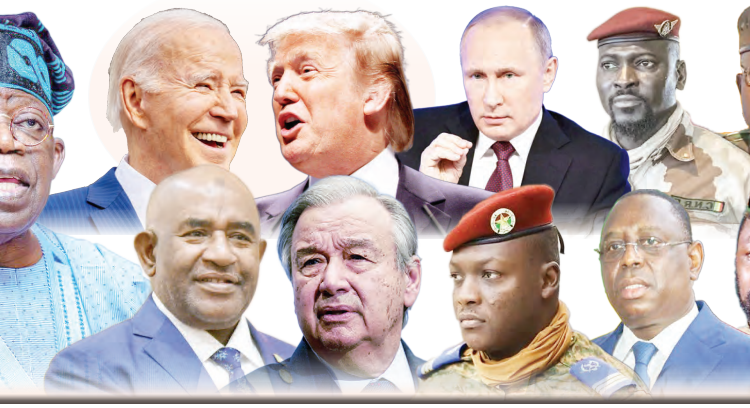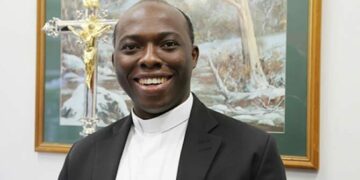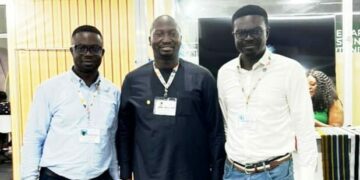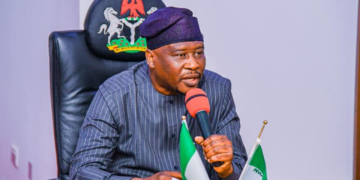The outcome of the 2024 presidential elections in the United States of America could have significant impact on global politics and even threaten the security of some of its allies across continents.
While the US election could prove consequential to the stability of entire continents, and is being treated as such by most world leaders, policy and security experts are predicting that Africa could end up as a spectator before, during and after the election.
Those who spoke with LEADERSHIP Sunday said leaders of the continent both at the national level and at the African Union (AU) need not be unprepared for a United States that could be less engaging in Africa.
The Regional Centre for Governance and Security Policy Initiative believes that Donald Trump’s America First policy could significantly impact the working of the African Union, the Economic Community of West African States (ECOWAS) and how they relate with the United Nations because the former president does not care much for multilateralism.
Concerns, however, remain that countries in Africa could be caught off guard by the impact of the election outcome, which also could lead to significant reduction in aid from the US to the continent, a disengagement from the security cooperation and a tightening of visa rules for people seeking to study, work or emigrate to the US.
In 2020, Trump placed visa restrictions on Nigeria and three other African countries. And today, more than ever before, young Nigerians are seeking opportunities to study and work in different parts of the world.
As president, many of the policies of the Trump government were unfavourable to Africa on these same issues, though he never actually carried out threats to completely disengage on security issues.
The election in the United States is also coming after close to a decade of a lack interest in Africa with both Donald Trump and current president, Joe Biden, keeping a distance.
With the exception of Ronald Reagan, all previous presidents going back to Jimmy Carter visited Africa multiple times.
The indifference by both Biden and Trump in some ways is manifesting in the unfolding political events in Senegal, a country most frequently visited by US presidents in Africa.
Officials within the Nigerian government who spoke with LEADERSHIP Sunday are convinced the US will remain engaged with ECOWAS over regional security regardless of the election outcome. Some foreign policy experts are however less confident.
In European capitals, governments are already preparing for a possible return of Donald Trump as president and are debating what it would mean for the security of the continent and the future of the North Atlantic Treaty Organisation (NATO).
During a rally on February 10, 2024, Trump rattled NATO by suggesting the US would not protect a member state that came under attack by an aggressor nation, in reference to Russia, if the member was not paying its financial obligation.
Some NATO members are already drawing up plans to go it alone without the United States when it comes to protecting themselves from possible Russian aggression. Germany, in particular, is reportedly to be preparing for a long and drawn-out confrontation with Vladimir Putin’s Russia.
Trump had, in the past, expressed willingness to make concessions to Putin and had also shown willingness to side with Russia over its war in Ukraine.
Donald Trump has all but secured the nomination of the Republican Party, while President Joe Biden is not facing any serious challenge for the presidential ticket of his Democratic Party, making the November election a possible rematch of 2020.
And for Africa, just like other parts of the world, it is not just another election.
According the information on the website of the US State Department, it provides Nigeria with one of the highest International Military Education and Training (IMET) allocations in sub-Sahara Africa, with approximately $5 million obligated from 2019 –2023.
Nigeria, it says, is an active member of the Trans-Sahara Counterterrorism Partnership (TSCTP) and has benefitted over $8 million worth of training, equipment, and advisory support for counterterrorism efforts between.
Regardless of the November election outcome, Charles Onunaiju, the director of the Centre for China Studies in Nigeria, believes security in sub-Saharan Africa should be solely reliant on the United States of America, the weapons or aid it provides.
Speaking with LEADERSHIP Sunday, he said, “I am not disparaging American partnership, but we have seen all this. We paid millions of dollars for the A-29 Super Tucano aircraft; at the end of the day, our security challenges have become hydra-headed.
“In as much as I have no doubt that the United States has remained a security partner, there is also a need to diversify our security partnership. There is a need to re-conceptualise our security framework; there is a need to redefine what actually constitutes our national security threat. These are critical fundamentals that cannot be solved by American partnership or how much money they provide.”
Onunaiju said most of the security issues in Africa do not require a response with weapons. What they require, he said, is social and economic inclusion.
Every day, he said, “The military high command in Nigeria announces the neutralisation of insurgents, but if the supply line continues to add more to the insurgents on account of social exclusion, when will it end? You can begin to appreciate the social context of these security challenges.”
In the ECOWAS region, there appears to be a losing battle against undemocratic forces, which have been exacerbated by Russian influence that has also made pressure from US government and its western allies ineffective.
Speaking with LEADERSHIP Sunday, Dr Jonathan Sandy, the executive chairperson of the Regional Centre for Governance and Security Policy Initiative, said the possibility of the US disengaging from Africa with Russia filling the void does not necessarily spell doom for democracy on the continent.
According to Dr. Sandy, as the war with Ukraine is going on, the partition of Africa is also playing out.
“The super powers – China and the US – are competing and Russia, in particular, is trying to undermine democratic values in most of our member-states.
“You ask why the military juntas often go to Russia, it is a deliberate effort to undermine the global peace and multilateralism. How are we going to manage Mali, Niger when the United Nations are pulling out? The reason why Donald Trump might have far-reaching implication for Africa is because he does not respect United Nation’s multilateralism,” Sandy said.
Burkina Faso’s Defence Minister General Kassoum Coulibaly had said recently that talks were on to pursue the implementation of “instruments, mechanisms and procedures” and the legal architecture for the confederation of the three countries.
The procedures will “allow our alliance and the confederation to function efficiently and to the great joy” of the three countries’ populations, his Niger counterpart General Salifou Modi said.
Making reference to the influence of Russia in West Africa and the attempt of Mali, Niger and Burkina Faso to break away from ECOWAS, Dr Sandy said the African Union and other regional bodies can still withstand the pressure.
He said, “Yes it does have implications, whether political, economic, social and, obviously, the impact on regional security, but it cannot cause the fragmentation of the African Union and ECOWAS.
“However, in my opinion, the nature of those nation states is that if they want to go it alone it is difficult. There are no more inter-state conflicts. The borders have been defined. Those days are gone.
“Most of the challenges we have or threats to national stability are coming from external sources like climate change, extremism, small arms and light weapons.
“Above all, when it comes to economic security agenda, all the three member states are landlocked, whether it is Burkina Faso, Mali or Niger; they rely on the ports in Cote D’Ivoire, Nigeria and Benin. How can landlocked countries survive?
“Because they came through military coup and it is against the shared values of ECOWAS, can the community dish out money to military regimes in the pretext that they are fighting violent extremist groups in the Sahel region? That is where the dilemma is.”
Dr Sandy, however, played down the impact of the three military juntas moving away from the bloc.
He said, “It has far reaching implication, but on the contrary, it may not affect other member states because we are more than they are. As you see, the African Union summit is ongoing but they are not there.
“They are up to eight: Gabon is not there; Guinea is not there, Mali is not there because their military regimes are against the African Union’s norms and values based on the African Charter on democracy, elections and good governance.”
Nevertheless, at the AU Summit in Addis Abba, ECOWAS chairman President Bola Tinubu said that Nigeria wants dialogue with Mali, Guinea, Burkina Faso and Niger.
The outcome of the US election could actually also reverberate in the area of foreign aid with the US spending an average of $8 billion every year in sub-Sahara Africa, according to the State Department.
In 2021, it said the country gave $8.5 billion in assistance to 47 countries and 8 regional programmes in sub-Sahara Africa.
In 2017 and again in 2020, the presidency in the United States made attempts to cut the budget of USAID, the agency responsible for managing foreign aid. At both times, lawmakers in the US resisted the cuts, though enough money was diverted to tackle the COVID 19 response in parts of Africa.
The House of Representatives controlled then by Democrats resisted Trump’s attempt to cut foreign aid in 2020.
Trump’s foreign aid proposal sought $44.1 billion in the 2021 fiscal year, compared with $55.7 billion enacted in 2020, which would have mostly affected programmes in Africa.
Dr Christopher Otabor, the medical director of Alliance Hospital in Abuja, believes a cut in US aid in Africa could send shocks within the health system in a country like Nigeria and reverse progress made in controlling malaria and tuberculosis.
Though there are no physical structures to show the level of US assistance in the health sector, it is thought that at least 25 million lives have been saved through the U.S. President’s Plan for AIDS Relief.
Otabor said more money has been spent on the programme in Africa over the last 20 years than an entire year’s budget in Nigeria, and because antiretroviral drugs are so expensive, the Nigerian government cannot fill the gap.
He also pointed to ongoing pilot programmes in some states towards producing sample models for how the primary health system should work as an example of US aid helping to strengthen health systems.





